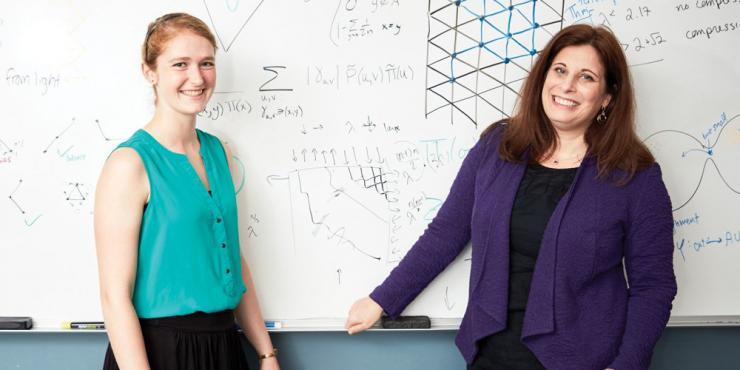Dynamic Duos: Algorithm Aces Dana Randall and Sarah Cannon
Jul 12, 2017 — Atlanta, GA

Algorithms rule Dana Randall’s professional life, but not in the way that many people might expect. Instead of dealing with the nuts-and-bolts of traditional data mining and analytics, she instead looks beyond the tactics to tackle more theoretical issues. “My work and research involves the background, foundational science behind developing algorithms and using data,” Randall says. “It’s often about being able to ask the right questions and making sure we’re collecting the right data.”
As an example, she posits that efforts to optimize a given outcome—like a business decision—may involve a tremendous amount of data. “It might be prohibitively slow to collect, sort and analyze all that data,” she says. “But there might be an approximation to that process—a shortcut of some sort—that could get you close enough to what you’re attempting to do that would be many-fold more efficient. And in this case it could make sense to relax your parameters and not look at every granular bit of data to arrive at your conclusion.”
That’s a lot to digest, but she’s not alone. In fact, in doctorate student Sarah Cannon, Randall has found a kindred spirit and fellow theoretical computer science geek. After earning her bachelor’s degree at Tufts and master’s degree at the University of Oxford, Cannon came to Tech specifically to study in the Institute’s Algorithms, Combinatorics and Optimization program.
Cannon works with Randall on a number of research projects.
“Right now we’re collaborating with some physicists to help them build robotics systems that change shape in a coordinated fashion to achieve a greater, global behavior,” Cannon says. “Using tools from theoretical computer science, we can help them model or predict the behavior of the entire system and understand what will emerge.”
Cannon also serves as a teaching assistant for Honors Discrete Math, a freshman course. “It’s great to see these new students getting really excited about a topic that most people don’t get excited about,” she says.
Her goal is to stay in academia for her career, and she’s watched Randall closely to pick up on her teaching and research leadership techniques. “I want to excel as a teacher,” Cannon says. “The way Dana teaches, interacting with students and getting them engaged and excited about the material, is what I hope to learn to do. ”
Last summer, Randall says Cannon took her teaching to a higher level. “We had a very strong undergraduate student and Sarah took it upon herself to mentor her and train her,” Randall says. “We just submitted a joint paper and because of Sarah’s influence, this student got her first taste of being a published academic herself.”
Randall’s praise doesn’t stop there. “Basically, I dream up things to do and Sarah does it all,” she says. “I hit the jackpot—she’s just fearless about research. She’s already earned some of the most prestigious awards in the theoretical computer science field, as well as some for her efforts to promote women in computing, something that’s very important to me.”
Randall serves as the ADVANCE Professor of Computing, and as part of the ADVANCE program, she helps sustain a network of top faculty members at Tech who support the advancement of women and minorities in higher education. “There’s one ADVANCE professor in every college,” Randall says. “It’s really a privilege to get to work with and learn from this group of women, especially when we’re able to turn ideas into policies that will attract more women to campus.”
Already loaded with a full plate as a teacher and researcher, Randall was named the co-executive director of Tech’s Institute for Data Engineering and Science last year. In this role, she’s helping to harness all the data expertise that resides on campus. “It’s a huge advantage for us in that we’re able to put all the pieces together from different areas—our resources and people are really coming together,” she says.
Roger Slavens
Georgia Tech Alumni Magazine




